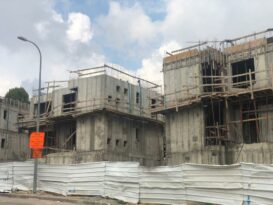This week, the Bank of Israel announced the raising of the restriction on the prime interest track in mortgage lending. Until now, borrowers have been limited to taking up to a third of their loan linked to the prime rate, which is considered to be the cheapest lending rate. Experts in the Israeli residential real estate market predict that “cheap money” will lead to rising prices, and also warn of the risk inherent in low-priced loans.
The Bank of Israel’s dramatic policy change in the prime interest linked component of mortgages, which is expected to significantly lower mortgage prices in the short term, creates a storm in Israel’s residential property market and generates expectations for rising home prices in the coming months.
According to a statement from the Bank of Israel, in light of the prevailing market conditions, the Bank is introducing amendments in order to ease borrowing for home buyers. The restriction on the prime interest component in a mortgage which currently cannot exceed one third of the total loan is to be lifted in a few weeks from now. At that time, the portion of the total loan linked to the prime interest rate may increase to two-thirds, however, at least a third of the loan must remain at a fixed interest rate.
Customarily, there are three tracks for mortgages in Israel: prime; index (inflation)-linked; and non-indexed fixed interest rates. The prime interest rate is a variable rate that is calculated according to the Bank of Israel’s interest rate plus 1.5%. Currently, the Bank of Israel’s interest rate stands at an exceptionally low rate of 0.1%, so the prime rate is officially 1.6%. In practice, most mortgage banks offer prime minus 0.4% to 0.6%, resulting in even lower rates of 1%-1.2%. As of October, the average (inflation) linked interest rate offered by the banks for a period of five years or more was 2.65%, compared with 3.5-4% for non-linked and fixed rates.
The decision of the Bank of Israel to increase the prime component of the mortgage means that instead of a third of the mortgage being taken at the lowest interest rate, two-thirds of the mortgage can now be taken at this rate. According to estimates, this could result in a saving for households of hundreds of shekels a month in mortgage repayments, which translates into tens of thousands of shekels over the full term of a mortage. As a result, the economic press in Israel anticipates an increase in demand for apartments, which will lead to a further hike in Israel real estate prices.
According to Aviram Tenenbaum, CEO and owner of the financial consulting firm Pardes, “There are two possible motives for the Bank of Israel’s decision to raise the limit on the share of the prime track in a mortgage. The first is to protect the real estate market. The Bank of Israel may be concerned that the market is declining which could lead to more severe damage to the economy. Making mortgages cheaper and therefore more attractive stimulates the real estate industry. Secondly, they may fear a possible scenario of high inflation, where index-linked mortgage borrowers will be vulnerable. By increasing the prime component of mortgages, the Bank of Israel reduces the public’s exposure to inflation.”

However, there are those who warn that the mortgage discount also poses a significant risk since the Bank of Israel’s interest rate may change over the years, and with that, the prime interest rate will vary too.
According to Tenenbaum, “everyone assumes that the prime rate route is the most attractive. Since over the past decade the Bank of Israel’s interest rate has been very low, it gives the public a sense that this will be the case in the future. But in reality, the prime rate can also be volatile. Less than a decade ago, the Bank of Israel’s interest rate was 3.25% and the resulting prime was 4.75%; almost 20 years ago, the Bank of Israel’s interest rate crossed the 9% mark, and subsequently, the prime crossed 10%. Generally, borrowers do not address long-term risk, rather they prefer to select the cheapest option available. It is important to remember that a mortgage is often taken for 20 or 30 years.”
Further, while eliminating the restriction on the prime interest component in the mortgage could lead to lower monthly repayments in the short-term, the move could also inspire an increase in the prime lending rate: Tenenbaum continues, “at the end of the day, the bank is a business that operates to generate profit. The prime track today is the least profitable route for the bank, so when customers want two-thirds of the total loan to be in prime, this will affect their profit margins… Therefore, instead of offering prime minus half a percent as is currently customary, banks may increase interest rates to prime plus half a percent. Thus, borrowers may find themselves on a path with an interest rate that is around 1% higher than expected.”
Following the change, which is likely to take effect in two or three weeks, pressure is expected on banks, and high performance is anticipated in the volume of new mortgages and in refinancing existing mortgages. Total mortgage portfolios in Israel currently amount to more than 400 billion Shekels. Of that, mortgages of 52.8 billion Shekels, which constitute 13.5% of all mortgages in Israel, are currently in a state of “grace” (postponement), following the Corona crisis. From January to October 2020, despite a sharp increase in unemployment in the wake of the Corona crisis, banks granted new mortgages totaling NIS 63 billion, which is 15% higher than the same period in 2019. It is expected that the new move by the Bank of Israel will add more fuel to the fire.






